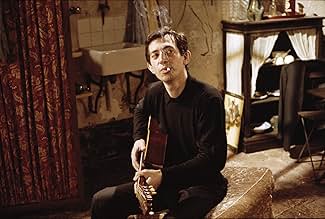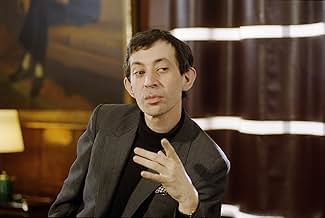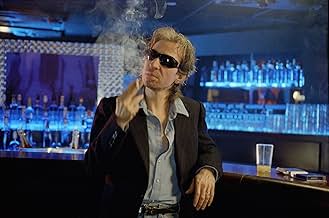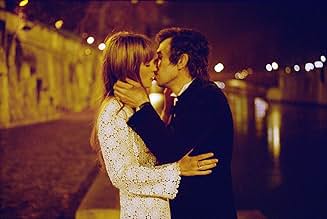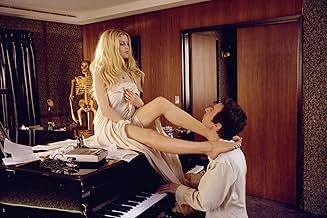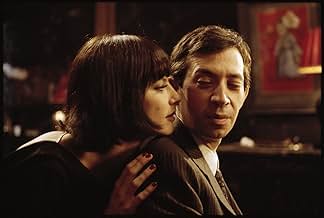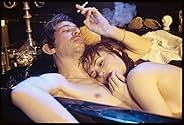Gainsbourg (Vie héroïque)
- 2010
- Tous publics
- 2h 15min
NOTE IMDb
6,9/10
11 k
MA NOTE
Un aperçu de la vie du chanteur français Serge Gainsbourg, de son enfance à Paris occupée par les nazis dans les années 1940 à ses années d'écriture dans les années 1960 jusqu'à sa mort en 1... Tout lireUn aperçu de la vie du chanteur français Serge Gainsbourg, de son enfance à Paris occupée par les nazis dans les années 1940 à ses années d'écriture dans les années 1960 jusqu'à sa mort en 1991 à l'âge de 62 ans.Un aperçu de la vie du chanteur français Serge Gainsbourg, de son enfance à Paris occupée par les nazis dans les années 1940 à ses années d'écriture dans les années 1960 jusqu'à sa mort en 1991 à l'âge de 62 ans.
- Récompenses
- 7 victoires et 11 nominations au total
Dinara Drukarova
- Olga Ginsburg (la mère)
- (as Dinara Droukarova)
Avis à la une
Serge Gainsbourg was many things: an artist, writer, painter, alcoholic and lover to many. He is a fascinating man who lead a fascinating life and director Joann Sfar makes a great effort here to portray it all. From the early days prior to WWII Gainsbourg was clearly going to amount to something. As he grew older and dabbled here and there in various art forms and dabbled in various women with lovers including Bridgette Bardot and Jane Birkin. Yet as he grew older Gainsbourg dabbled in more drink and drugs and this led to a troubled life.
I was to begin with fascinated by this man, full of charm and wit and ideas abounding. Yet as the film progressed I felt less and less concerned by this man and began wondering when the film might end. As interesting he was, he was also not the nicest of characters, especially in his latter years when he appears to be a drunk and grumpy man. The little touches of fantasy work well to begin with, Gainsbourg's 'imaginary friend' is interesting, but then becomes more and more grotesque and yet more annoying and often blurs the line between realism and surrealism.
Ultimately this has enough to provide an interesting account of someone who had a very full life, but for me it lost it's way part way through and therefore lost it's momentum.
More of my reviews at iheartfilms.weebly.com
I was to begin with fascinated by this man, full of charm and wit and ideas abounding. Yet as the film progressed I felt less and less concerned by this man and began wondering when the film might end. As interesting he was, he was also not the nicest of characters, especially in his latter years when he appears to be a drunk and grumpy man. The little touches of fantasy work well to begin with, Gainsbourg's 'imaginary friend' is interesting, but then becomes more and more grotesque and yet more annoying and often blurs the line between realism and surrealism.
Ultimately this has enough to provide an interesting account of someone who had a very full life, but for me it lost it's way part way through and therefore lost it's momentum.
More of my reviews at iheartfilms.weebly.com
This is a film that makes no bones about the ultimate squandering of Serge Gainsbourg's talents in a drink - induced decline but at the same time shows the creative and cultural force that his very surname still brings to mind for most French people . The movie brings out particularly well the smoky atmosphere of jazz clubs and gigs where the young Serge first plied his musicality in the 1950s. The phases of his life, from young Jewish boy in occupied France through his creative life and personal life ( for instance )amours with such as Brigitte Bardot and Jane Birkin in the 1960s are dizzily but effectively handled . There is some attempt by Director Sfar to portray Gainsbourg , in late career , as something of an anti- intolerance man of principle but the overall impression given is of an imaginative , somewhat amoral figure whose life was ultimately an example of artistic decline and hedonistic self-indulgence . The film is rather long but, overall , sustains interest well . The main roles are all played well by the actors ,including the female leads Laetitia Casta and the late Lucy Gordon , and the cartoon - like features of the movie , such as Serge's giant alter-ego , impressionistically contribute something positive to the story . Viewers from Anglophone countries who will best remember Gainsbourg as the singing half of the 1969 heavy- breathing pop hit " Je t'aime moi non plus " may still leave the cinema wondering what really was the artistic importance of Serge . Yet they will nonetheless , on the strength of this bio-pic , carry away an image of the principal character as an unforgettable personality .French people , on the other hand , who already regard him as a cultural icon and , in their terms ,as a genius will not need this movie to make up their minds about Serge Gainsbourg .
GAINSBOURG (Vie héroïque)
from the Studio Canal stable depicts the life story of Serge Gainsbourg from early childhood in the 1930's and 40's, until just before his death in 1991.
Born Lucien Ginsburg – and as an impressionable youth he felt outcast as being a Jewish child in Nazi occupied Paris in the 1940's – leading him to develop an imaginary friend who adopted an increasingly grotesque caricature / persona of himself that would lead him on to do more and more outrageous things to "rebel" his situation and to attempt to gain an element of "love" and "acceptance" from his notoriety.
A talented musician and artist, Lucien (who later was persuaded by friends to change his name to the more "acceptable" Serge Gainsbourg) became the darling of the social scene, charming his way through a succession of affairs with beautiful women – most notably Brigitte Bardot, Juliette Greco, and Jane Birkin.
I'm surprised that they didn't have a cigarette company sponsoring this movie – as the sheer amount of fags smoked during this film must be some sort of record!
After the showing of the film (at the Cineworld, Haymarket, London) we were treated to a Question and Answer session with the Writer / Director of this movie JOANN SFAR, who explained that the idea for the film came from his own graphic novel on Serge Gainsbourg penned by JOANN SFAR – and this pretty much formed the construct and ambiance of the movie – it is highly graphical and visual in it's content – much of it being fantasy visions and flashbacks within Gainsbourg's mind. Talking from the heart – Joann showed a real passion for the film, and was very open as to how the film was created.
Gainsbourg became the darling of French society with his talent and flair – but he also would court scandal and became infamous for the release of "Je t'aime... moi non plus" (which he originally wrote for Bardot) and the seemingly disrespectful reggae version of the French national anthem "La Marseillaise", but love him or loath him – you couldn't ignore him ..
The whole movie is very atmospheric, and some of the casting of this film was inspired – especially the terrific performances by Eric Elmosnini in the title role, the stunning beautiful Laetitia Casta as Brigitte Bardot, Lucy Gordon as Jane Birkin, Anna Mouglalis as Juliette Greco and Kacey Mottet Klein as the young Lucien Ginsburg.
At the end credits of the film is a dedication "to Lucy" which referred to the actress Lucy Gordon – who (the director explained) played the part of Jane Birkin in the film – and who had tragically committed suicide during the final editing parts of the film – a talented actress – and a sad loss.
At 2 hours 10mins long, in French with English subtitles GAINSBOURG will not be everyone's cup of tea but the film DOES keep you entertained and if you give it a chance, I'm sure that you will not be disappointed ...
It's not big or clever to smoke, and it doesn't make you look cool unless you happen to be Serge Gainsbourg !
GAINSBOURG is on general release from 30th July 2010
Born Lucien Ginsburg – and as an impressionable youth he felt outcast as being a Jewish child in Nazi occupied Paris in the 1940's – leading him to develop an imaginary friend who adopted an increasingly grotesque caricature / persona of himself that would lead him on to do more and more outrageous things to "rebel" his situation and to attempt to gain an element of "love" and "acceptance" from his notoriety.
A talented musician and artist, Lucien (who later was persuaded by friends to change his name to the more "acceptable" Serge Gainsbourg) became the darling of the social scene, charming his way through a succession of affairs with beautiful women – most notably Brigitte Bardot, Juliette Greco, and Jane Birkin.
I'm surprised that they didn't have a cigarette company sponsoring this movie – as the sheer amount of fags smoked during this film must be some sort of record!
After the showing of the film (at the Cineworld, Haymarket, London) we were treated to a Question and Answer session with the Writer / Director of this movie JOANN SFAR, who explained that the idea for the film came from his own graphic novel on Serge Gainsbourg penned by JOANN SFAR – and this pretty much formed the construct and ambiance of the movie – it is highly graphical and visual in it's content – much of it being fantasy visions and flashbacks within Gainsbourg's mind. Talking from the heart – Joann showed a real passion for the film, and was very open as to how the film was created.
Gainsbourg became the darling of French society with his talent and flair – but he also would court scandal and became infamous for the release of "Je t'aime... moi non plus" (which he originally wrote for Bardot) and the seemingly disrespectful reggae version of the French national anthem "La Marseillaise", but love him or loath him – you couldn't ignore him ..
The whole movie is very atmospheric, and some of the casting of this film was inspired – especially the terrific performances by Eric Elmosnini in the title role, the stunning beautiful Laetitia Casta as Brigitte Bardot, Lucy Gordon as Jane Birkin, Anna Mouglalis as Juliette Greco and Kacey Mottet Klein as the young Lucien Ginsburg.
At the end credits of the film is a dedication "to Lucy" which referred to the actress Lucy Gordon – who (the director explained) played the part of Jane Birkin in the film – and who had tragically committed suicide during the final editing parts of the film – a talented actress – and a sad loss.
At 2 hours 10mins long, in French with English subtitles GAINSBOURG will not be everyone's cup of tea but the film DOES keep you entertained and if you give it a chance, I'm sure that you will not be disappointed ...
It's not big or clever to smoke, and it doesn't make you look cool unless you happen to be Serge Gainsbourg !
GAINSBOURG is on general release from 30th July 2010
I did watch this film in it's premiere in Athens, at the festival of Franchophone films.I liked the movie which incorporated many surreal and fantasy elements in the linear narrative of the life of the hero. He had an alter ego, which was the substantiation of a childhood fantasy which always tried to tempt him to follow the broad path that led to riches, fame, sex and power. He followed the advice of his evil other self and he became the public icon we know from history and the media. Emphasis is also given to his Jewishness and his courage to manifest it before collaborationist authorities as a young boy.
Excepting the marked surreal elements which the director in an introductory speech attributed to the fact that he is also a comic strip creator, the film emphasizes what we already know, that is his incessant womanizing, publicity seeking and studied provocative stance, culminating in his memorable if controversial rendering of the Marselleise-the French national anthem-in a reggae music version and a refrain that was full of irony.
The sometimes overemphasized description of his rampant sexuality drove some of the audience out of the theatre as did the depiction of his reggae version of the French national anthem. But this was obviously an overreaction due either to ignorance or desire to cut a figure. If you had the slightest idea of who Gainsbourgh was, you would not be expecting anything else from a movie dedicated to his life story.
Because Gainsbough was prone to the pleasures of the flesh with women famous or ordinary, many impressive actresses such as Laetitia Casta and Anna Muglalis appear in the movie portraying the gorgeous women he had affairs with. The whole impression you form is that he had been a anti-authoritarian bobo(bourgeois-Boheme) before this term had been invented.
There is also a sensitive depiction of his relationship with his parents, which was closer and more intimate than one would expect from a man who had such an obvious (real or affected) grudge towards authority.The actresses play convincingly the women of his life, who were glamorous and sexy. In the end one is left with the question whether such a life is enviable and worthy of emulation or example to avoid. whichever answer each one reaches, as a spectacle it is surely interesting to see.
Excepting the marked surreal elements which the director in an introductory speech attributed to the fact that he is also a comic strip creator, the film emphasizes what we already know, that is his incessant womanizing, publicity seeking and studied provocative stance, culminating in his memorable if controversial rendering of the Marselleise-the French national anthem-in a reggae music version and a refrain that was full of irony.
The sometimes overemphasized description of his rampant sexuality drove some of the audience out of the theatre as did the depiction of his reggae version of the French national anthem. But this was obviously an overreaction due either to ignorance or desire to cut a figure. If you had the slightest idea of who Gainsbourgh was, you would not be expecting anything else from a movie dedicated to his life story.
Because Gainsbough was prone to the pleasures of the flesh with women famous or ordinary, many impressive actresses such as Laetitia Casta and Anna Muglalis appear in the movie portraying the gorgeous women he had affairs with. The whole impression you form is that he had been a anti-authoritarian bobo(bourgeois-Boheme) before this term had been invented.
There is also a sensitive depiction of his relationship with his parents, which was closer and more intimate than one would expect from a man who had such an obvious (real or affected) grudge towards authority.The actresses play convincingly the women of his life, who were glamorous and sexy. In the end one is left with the question whether such a life is enviable and worthy of emulation or example to avoid. whichever answer each one reaches, as a spectacle it is surely interesting to see.
The life story of Serge Gainsbourg had to be filmed, and as he's one of the famous Frenchmen who aren't in fact Belgian, it's only a surprise that it took so long. That his life spanned the Nazi occupation to the rise of Disco would stretch credibility if this were fiction, but as it's all more or less true the director, who is already an accomplished graphic artist, manages to lift it to the level of slightly absurd fiction. Mixing in animation, self-consciously stagey sets and a life-sized puppet as Gainsbourg's dreaded alter ego.
Even the sordid lowlife is given the big treatment, and the early days in the garret look unashamedly glamorous as they would if re-imagined for an opera set or a Salvador Dali dream sequence, as director Joann Sfar lays it on with a trowel.
The episodic nature of the story gives it a rather patchy feel though, and I couldn't help thinking that one or two episodes, especially the cute Hollywood-style musical scene with Brigitte Bardot, could have been shorter. Bardot was just one of the high-profile women Gainsbourg captured, and so was the muse of the existentialists, Juliette Greco.The casting is pretty uncanny with the possible exception of Greco, who was never that model-thin.
Gainsbourg has always been, at least outside France, more famous for being cool than for his music. But his reworking of La Marseillaise which so upset the rightwing patriots of the Seventies was nothing but excellent. I'll go back just to hear that Sly and Robbie riddim one more time.
Quite a substantial feast but it's worth building up an appetite in advance. And of course, you get Jane Birkin and... That Song.
Even the sordid lowlife is given the big treatment, and the early days in the garret look unashamedly glamorous as they would if re-imagined for an opera set or a Salvador Dali dream sequence, as director Joann Sfar lays it on with a trowel.
The episodic nature of the story gives it a rather patchy feel though, and I couldn't help thinking that one or two episodes, especially the cute Hollywood-style musical scene with Brigitte Bardot, could have been shorter. Bardot was just one of the high-profile women Gainsbourg captured, and so was the muse of the existentialists, Juliette Greco.The casting is pretty uncanny with the possible exception of Greco, who was never that model-thin.
Gainsbourg has always been, at least outside France, more famous for being cool than for his music. But his reworking of La Marseillaise which so upset the rightwing patriots of the Seventies was nothing but excellent. I'll go back just to hear that Sly and Robbie riddim one more time.
Quite a substantial feast but it's worth building up an appetite in advance. And of course, you get Jane Birkin and... That Song.
Le saviez-vous
- AnecdotesThe project was originally envisioned with Serge Gainsbourg's real life daughter, actress Charlotte Gainsbourg to play him in keeping with the film's surreal and fairytale-esque tone. Six months into rehearsals and preparation Gainsbourg pulled out telling director Joann Sfar, it was proving too emotionally painful and he would have to make his "beautiful film" without her. Sfar had always approached the film with her in mind and was ready to abort the project when fate lead him to Eric Elmosnino.
- GaffesThe young Gainsbourg is shown drawing left-handed, but the adult Gainsbourg becomes right-handed.
- Citations
Serge Gainsbourg: [after a man tips him while he plays the piano] What are you fucking kidding me? I'm not a jukebox!
- Crédits fous"Pour Lucy" i.e. this was Lucy Gordon 's last film.
- Versions alternativesEngland is the first territory to release a new cut of the film, running 14 minutes shorter than the previous version and is Joann Sfar's preferred one. Changes include -
- Deletion of the scene where young Serge pleads in vain for his mother to buy him a gun to play with, even attempting to bribe her by saying he'll work harder on the piano. This precedes the scene where he steals the gun from the shop.
- Deletion of the scene where Serge and Boris Vian walk to his apartment and the two lie in the road in an effort to stop a cab. While they wait Serge reveals he has a double that follows him around to which Vian replies his is a werewolf. However two policemen soon cut the conversation short. (This precedes Serge arriving at Boris's apartment and explains a later scene where a drunken Serge lies in the road before having the police escort to his concert)
- Longer scene of the "Baby Pop" groupies, as Gainsbourg wakes up in bed with two naked women as his Mug joyously tosses bank statements at him revealing how rich he is from "Poupée de cire, poupée de son" alone! This is the original lead in to "Qui Est In Qui Est Out".
- The groupies and party to "Qui Est In Qui Est Out" is cut short, removing Serge narrating about "the mouth being the primary sexual organ". His narration reveals the girls in the room he has slept with and how he was with them. It reveals Gainsbourg's occasional cruel streak and precedes the angry neighbor banging on the door.
- After Gainsbourg recites La Marseillaise at the press conference, we then see young Serge repeating it and triumphantly raising his fist to the audience.
- Deletion of a short exchange in the nightclub when a reveller comments to Gainsbourg about him being parodied on a French TV show. The new version removes these lines either because the show is unknown outside of France or because it doesn't tie in as being the night Gainsbourg met his wife Bambou as that TV show wouldn't air until years later. Sfar has said this new version will be the one further released worldwide.
- ConnexionsFeatured in De wereld draait door: Épisode #5.128 (2010)
Meilleurs choix
Connectez-vous pour évaluer et suivre la liste de favoris afin de recevoir des recommandations personnalisées
Détails
- Date de sortie
- Pays d’origine
- Sites officiels
- Langues
- Aussi connu sous le nom de
- Gainsbourg: A Heroic Life
- Lieux de tournage
- Rue de Verneuil, Paris 6, Paris, France(Gainsbourg's house)
- Sociétés de production
- Voir plus de crédits d'entreprise sur IMDbPro
Box-office
- Budget
- 11 500 000 € (estimé)
- Montant brut aux États-Unis et au Canada
- 233 007 $US
- Week-end de sortie aux États-Unis et au Canada
- 25 189 $US
- 4 sept. 2011
- Montant brut mondial
- 12 220 456 $US
- Durée
- 2h 15min(135 min)
- Couleur
- Mixage
- Rapport de forme
- 2.35 : 1
Contribuer à cette page
Suggérer une modification ou ajouter du contenu manquant




